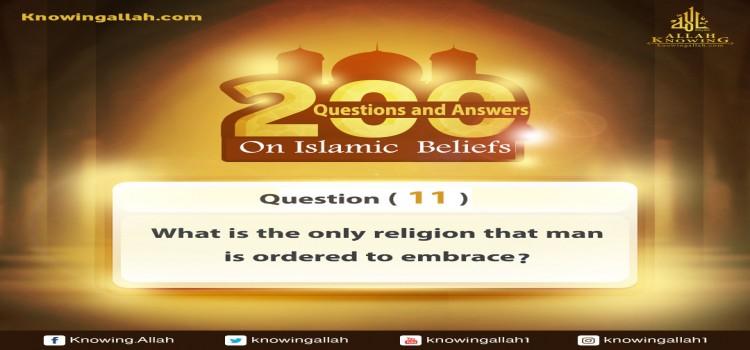The Signs of True Devotion (monotheism)
The Signs of True Devotion (monotheism)
Among the signs of true monotheism are the following:
1. Sincere devotion to Allah: That is to devote your words, your deeds, and all of your strivings for the sake of Allah alone and for His pleasure, hoping and longing for the rewards He has promised, and fearing His punishment. Giving no regard for worldly benefit, fame, or the praise of others or any other kind of showing off or shirk that can wipe away a person’s good deeds. Allah said, “And they were not commanded except to worship Allah [being]sincere to Him in religion.”(97:5).
Just as what the Prophet said, “Allah does not accept among the acts [of devotion] except those which are sincerely done to seek thereby Allah’s pleasure.” Therefore, devotee worship tawhid al-ibadah is built upon sincerity. An act of devotion can be correctly performed but be misdirected, it may lack a correct intention by not being sincerely directed toward Allah. As a result, the false intention spoils the good deed until it becomes ugliness.
2. Judging oneself by the Law of Allah. That is to say, the sincere believer refers all things to what Allah has revealed, and takes Allah’s revelation, and His law as his guide throughout his life, as the fundamental principles by which he judges all things, whether they relate to the affairs of this world or the next. Allah said, “And whoever does not judge by what Allah has revealed, those are truly the disbelievers, (wrongdoers, unjust), (defiantly disobedient).” (5:44-46)
In other words, we are to give precedence to Allah’s authority, rather than to the authority of positive laws that people have imposed upon themselves, and which they are modifying every time because of its inconsistency with man’s demand.
But as for Allah, it is He Who created, and it is He Who knows best what is best for its affairs. He created mankind and knows better than they what is best for them in their spiritual and material lives. Allah said, “Does He not know what those whom He created? And He is the Subtle, the Aware.” (67:14) And He said “The decision (of ruling and legislating is the right of none but ) to Allah.” (12:40), and He said, “Is it the judgement of jahiliyah [the time of ignorance] that they are seeking? But who is better judgement other than [the judgement of] Allah for a people who belief?” (5:50)
Allah has permitted the lawful and prohibited the unlawful, and there is no other way to know the lawful and the unlawful except by way of Allah’s revelation to His Messenger. We can know it through the text of the Quran and the sunnah, or through the rules that are derived from these texts of these two sources. Whoever seeks other way than Allah’s way, permitting what Allah has prohibited, or prohibiting what Allah has permitted, will have assigned a partner to Allah, as lawgiver, and will have sought some other law. Allah said, “Or have they partners [other than Allah] who made lawful for them (matters) in religion that which has not allowed?” (42:21) Shirk of obedience to those who Disobey Allah One of the types of shirk that the Jews and the Christians fell in before is that, “They have taken as lords beside Allah their rabbis and their monks.” (9:31)
This verse astonished one of the Companions, ‘Adi bin Haatim, after he had accepted Islam. He had formerly been a Christian. He said, “O Messenger of Allah, we did not used to worship them.” The Prophet said “Didn’t they permit what is unlawful and prohibit the lawful and you followed them?” He said, “Yes.” The Prophet said, “Doing that was to worship them.” And in another narration, “They were not worshiping them, but whenever they permitted something they used to obey them in permitting it, and when they prohibited something, all prohibited it.”53
3. Love of Allah this requires that we precede our love to Him above all other things, and that we give precedence to what He wants above what his creatures want and desire for themselves.
Allah said, “And among people are some who take apart from rivals, they love them as they [should] love Allah. But those who believed are stronger in love to Allah” (2:165).
Our love for Allah must exceed our love for property, families, and for our parents. Allah is true, and His way is the way of truth. How then could we possibly struggle and strive for maintaining the truth and resisting the evil if our love to the worldly things exceed that of Allah? How could we possibly make Jihad that may result the loss of our properties or even our souls? No one will give his soul for Allah if he loves
it more than Him.
This verse denounced those, whose love for something other than Allah is like their love for Allah. How then would it be for someone who loves these things more than they love Allah? Allah said, “Say: If your fathers, and your sons, and your brethern, and your wives, and your tribe, and the wealth that you acquire, and merchandise for which you fear to lose, and dwellings you desire, are dearer to you than Allah and His messenger and striving in His way: then wait till Allah brings His command to pass, for Allah guides not the defiantly disobedient.” (9:24). The Prophet said, “When you do business in eenah(54) [forbidden trade], and hoard up livestock, and become content sitting in your green fields , and abandon
jihad in the way of Allah, then Allah will send you humiliation that will not be lifted
until you return to your religion.”(55).
Faith is not complete until the Messenger of Allah is more dear to a believer than his parents, and his children and indeed, all people, and not until he loves what Allah and His Messenger love: and until the believer loves his fellow believer, loving him for nothing but for the sake of Allah.
-----------------------------
53 [al-Tirmidhi 3094. Its isnad is classed as hassan].
(54) Doing business in forbidden ways. This is to sell goods to someone for a specific price while setting a time in the future for delivery, then buying back the same goods for a lower price before delivery. It is as kind of riba.
(55) Abu Daud 3462, its isnad is sahih



